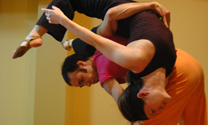The Conference “Third Space” was held in Vienna between 15-19 September 2008 with the participation of 20 countries from Europe, Middle East and the Mediterranean. The conference was organized by Freie Theater from Austria with the partnership of UK, Israel (Arma Theater) and Turkey (Simya Sanat). Being held for the first time in Italy during May 2007, the Third Space conference emphasizes the theme of ‘Theatre in the times of War’. In this scope, the conference invites cultural operators and artists from the countries in conflict as well as from European countries, as participants.
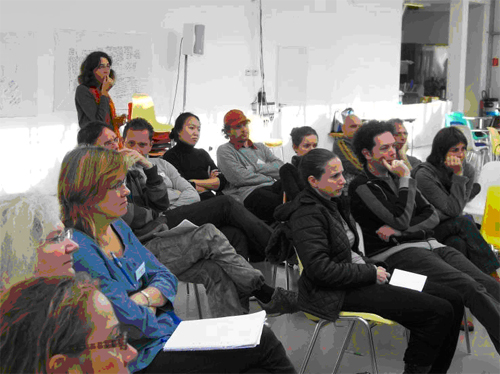
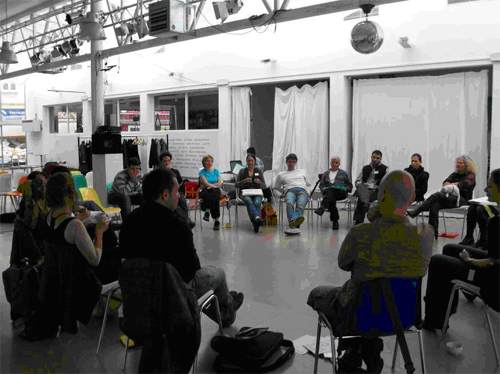
With the main objectives of promoting awareness of the independent sector’s role as ‘cultural ambassador’ through inter-cultural dialogue and cultural exchange as well as networking and developing a common political lobby at European level; EON Network also focuses on the preferable forms of making art in conflict regions. During the conference, the questions which are possible to ask, and which are tabooed, and which shall be approached in sensitivity have been discussed.
The basic question was, ‘Is theatre in the times of war even possible’? The work of artists in the conflict regions were presented to all the participants through video recordings and DVD’s. These make quite clear that it is possible to make art in every condition, because art is the fundamental requirement of human. What else can it be? Could it be a mean for knowledge sharing, feeling sharing and explaining the people what is going on? What capacity the theatre can take on? The role of art for a critical approach is possible to what extend? These were the other topics discussed during the conference.
In addition to Pakistan, Israel, Kosovo who lived in war in the recent past, many countries experienced conflict in their recent history such as Bulgaria, Cyprus and Turkey. What should be the role of an artist living in a conflict region as well as those living in the regions in peace?
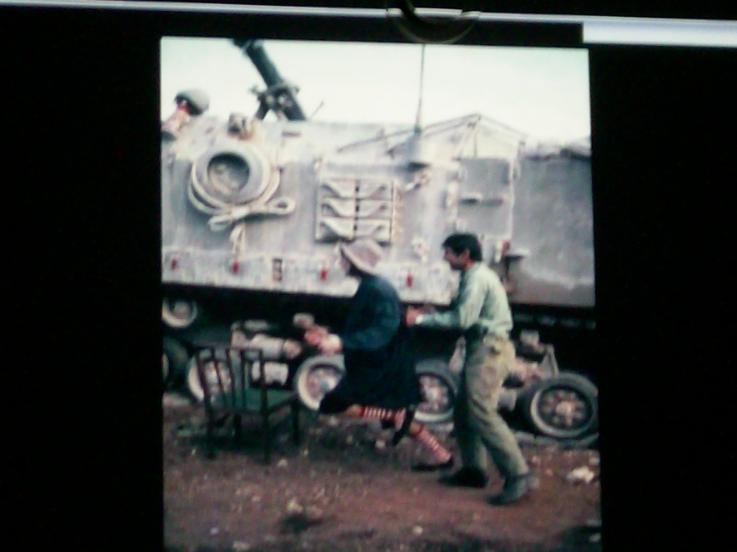
Human kind started to learn counting till 3 in a few centuries. It had really taken so long time to count one and two and finally three. And regarding choices, understanding the ‘third way’ has not still been fully achieved.
With Game Theory in 1944 by John Von Neumann, for the probability of human in relations and economy, human mind first count to ‘Third’. Before Game theory, human mind reflected his choices with Two, to lose or win in the place of others: ‘Zero Sum Game’.
Today, with the quantum theory, people know that they have a possibility extending from one to infinite. Nevertheless, this openness has not been reflected in all areas such as international relations until now.
Is there a third way to overcome the disputes?
‘Third Space’ is the concept of Homi K. Bhabha, an Indian philosopher from Harvard University. He believes that culture is not the solid entity which has ended its formation. Culture maintains its formation. It’s dynamic rather than static. Third space also refers to the space not belonging to the first or second; but rather being born from the mutual relations of the first and the second. Sharon Todd explains third space as the shared space where each is involved in an exchange with the other. It is not fixed at all; it is hybrid. It’s the understanding that provides the opportunity to escape from the dualistic and static worldview. It is a space ‘of always becoming’.
In today’s world, generally in public policies, it is sometimes forgotten that arts have the power to introduce different possibilities and healthy ways of communication.
In fact, the power of emancipation is rooted in the art work in a most healthy and direct way. Thus, arts can be a therapy method for public in the post-war period and function as to foster communication and create a common platform for dialogue and understanding.
1st Third Space Conference in Brescia, Italy
Extending Principles and Priorities for the Other!
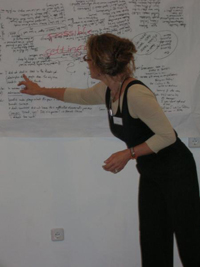 Theatre in times of War was one of the three main topics discussed at the second large meeting of the European Off network (EON) in Brescia, Italy in May 2007. A lecture and two half days of discussions were planned to be held during the meeting. The coordinator of the Third Space, Sabine Kock from Freie Theater explains: ‘From a significant bad situation – Zoe from Belgrade who should hold the main lecture could not get her visa and enter to Italy - an unexpected and surprising solution resulted: Spontaneously theatre-creatives from current crisis regions like the Gaza strip and Israel, from the Kosovo, Serbia and Croatia and further countries, which were involved into the Balkans conflict, showed short video and DVD cut-outs from their work: War and post-war realities in the former Yugoslav area were there on the stage to see partially aesthetically strongly reserved, and partially realistically oversubscribed: From a production from Croatia a sequence originates over the brutal murder of babies in a serial dance taking from the buggy in such a smooth way, that the horrible act of violence remains unbelievable as origin of the scene, while in a Kosovarian improvisation a young actress was hardly to look rooting/digging in a large lump raw meat, while telling a rape with deepness of existential emotion. Theatre seems to be in the Balkans area - related to the conflicts of the recent past - a symbolic experience area, in which the traumata of the experienced can be removed the taboo from and be through-lived in the representation of Catharsis. And this concept seemed to be accepted in all conflict sides of the various crisis region, anyhow all productions of those, which participated from Croatia, Serbia, Kosovo, Bosnia in the EON meeting: All sequences from the area were related to tragedy and or he concept of Catharsis played more or less with elements of pathos.’
Theatre in times of War was one of the three main topics discussed at the second large meeting of the European Off network (EON) in Brescia, Italy in May 2007. A lecture and two half days of discussions were planned to be held during the meeting. The coordinator of the Third Space, Sabine Kock from Freie Theater explains: ‘From a significant bad situation – Zoe from Belgrade who should hold the main lecture could not get her visa and enter to Italy - an unexpected and surprising solution resulted: Spontaneously theatre-creatives from current crisis regions like the Gaza strip and Israel, from the Kosovo, Serbia and Croatia and further countries, which were involved into the Balkans conflict, showed short video and DVD cut-outs from their work: War and post-war realities in the former Yugoslav area were there on the stage to see partially aesthetically strongly reserved, and partially realistically oversubscribed: From a production from Croatia a sequence originates over the brutal murder of babies in a serial dance taking from the buggy in such a smooth way, that the horrible act of violence remains unbelievable as origin of the scene, while in a Kosovarian improvisation a young actress was hardly to look rooting/digging in a large lump raw meat, while telling a rape with deepness of existential emotion. Theatre seems to be in the Balkans area - related to the conflicts of the recent past - a symbolic experience area, in which the traumata of the experienced can be removed the taboo from and be through-lived in the representation of Catharsis. And this concept seemed to be accepted in all conflict sides of the various crisis region, anyhow all productions of those, which participated from Croatia, Serbia, Kosovo, Bosnia in the EON meeting: All sequences from the area were related to tragedy and or he concept of Catharsis played more or less with elements of pathos.’
A group of young Serbian women analyzed this fundamentally critically: in their eyes theatre is a possibility of symbolising but overloaded of reality and could be completely not more than a "discourse" but never a possibility for the knowledge of reality of the war.
What is Peace as well as What War is…
At the discussions during the Third Space conference, artists and cultural operators have sought the ways to analyse what is peace as well as what war is. To explain peace and demonstrate the state of peace to the audience is as crucial as explaining what the war is.
Ilkay Sevgi, from Simya Sanat representing Turkey at the conference says, “Identity is enriched as you get familiar with the other. There, you began to discover the unity of time. You realize that despite the place or geography that separates you, the time unites… You realize that you have much more similarities with a person living in the present time but thousand miles far away than people lived hundred years ago in the same place or geography in which you are… As it is noted in the Peace Culture conferences organized by Unesco in the recent past, the human is naturally in a state of peace; and the responsibility of creating reasons for war and consciously depicting the human nature in a wrong manner largely belongs to audio-visual information networks. At this point, artistic communication sources may be utilized with this aim in the most natural way. Theatre may be used to inform and create empathy. In this frame, the mobility of artists, especially living in conflict regions, and their performances in various countries shall be supported’, adding that “Through Communication, everything changes. Art is the communication by heart, which is no trivial than brain, but in fact, reflects the full shape of reality.”
Thanks to EON Network, Sabine Kock and Freie Teater Team and all the participants for bringing their culture, knowledge and experiences to this platform.








